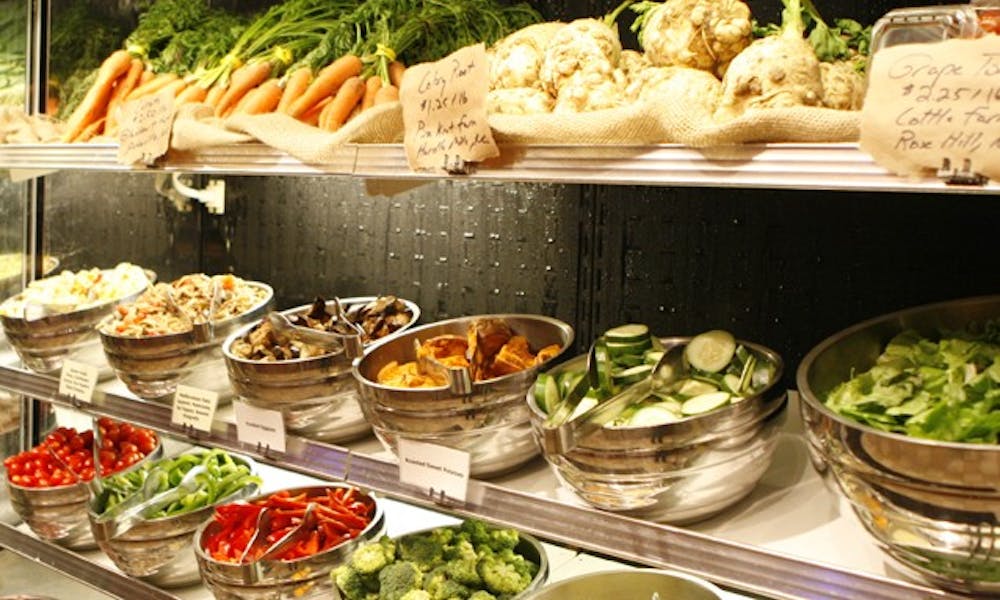While her friends scarf down burgers and fries, junior Sarah King opts for vegan alternatives, like all-natural smoothies, pita with hummus and meatless chili.
But King said she does not feel like she is missing out. She became a vegan her junior year of high school when she gave up all animal-derived foods—including eggs and dairy products.
“All in all, the vegan diet can provide a lot of benefits in terms of energy and overall well being,” King said. “I also pay more attention to where my food comes from, and eat less processed foods. I’d like to try a raw diet someday too.”
The number of vegetarians, vegans and other healthy-eaters has been increasing nationally over 15 years of polling conducted by the Vegetarian Resource Group. Because of the many different kinds of eaters who consider themselves vegetarians, estimates for each specific type are difficult to calculate. Many follow a traditional meatless vegetarian diet, but there are slight alterations, such as “pescatarians” who accept fish and “pollo-vegetarians” who eat poultry.
Three percent of U.S. adults now consider themselves vegetarian compared to about 1 percent a decade ago, according to a 2009 VRG poll of more than 2,000 people. Data from the same organization indicates that roughly one-third of vegetarians follow a vegan diet. Even meat eaters are choosing wholesome foods when given the option.
“What used to be thought of as ‘way out there’ is now very every day,” said Franca Alphin, director of Nutrition Services at Student Health. “I think more and more people are realizing the health benefits of this way of eating. We have quite a few students at Duke that are vegetarian.”
Duke is no exception—college students in particular are prime candidates for the trend, said adjunct professor Charlie Thompson, who is currently teaching a cultural anthropology class on the “politics of food.” Young adults comprise one of the largest vegetarian demographic groups.
“Students here have the privilege of higher education, which is where people become more aware of the realities of the food market,” Thompson said. “In contrast, there are many people in our country who are too poor or otherwise unable to have any choice in the matter.”
Although most people associate vegetarianism with wholesome living, Alphin warned that this scenario is not always the case. Some vegetarians may have deficiencies in essential nutrients that are best found in meat, poultry and fish, said Alphin. She added that as long as students supplement their diets accordingly, vegetarianism can be a well-rounded option.
As vegetarianism expands nationally, it has also evolved at Duke. For example, Duke’s vegetarian club PlanV unites healthy eaters on campus by serving nourishing meals and raising awareness about vegetarianism. PlanV also helps smooth students’ transitions from home cooked foods to dining hall fare, King said.
Director of Dining Services Jim Wulforst said all campus eateries cater towards vegetarians in some respect by offering healthy options. Even so, menu choices can be limited.
“Overall, Duke has a lot of good options with great, fresh food,” said Noel Shaskan, a senior who is a pescatarian. “But in terms of strict vegetarian foods, there are only a few places that consistently have vegetarian fare.”
Duke University Student Dining Advisory Committee co-Chair Jason Taylor, a senior, wants to see more options on campus for healthy eaters.
“It’s getting better, but personally, I am not satisfied,” Taylor said. “I want to push everywhere on campus to continue improving, but relative to other college campuses, we do have a better environment.”
Senior Caroline Yoder, a vegetarian who is a DUSDAC committee member, said she would like to see more menu items for vegans. Because most of Duke’s vegetarian options have cheese, it is nearly impossible to be a vegan on campus, she said.
King said the lifestyle is possible, but said she likely would not be able to sustain her eating habits without the financial support of her parents. She added that she runs out of food points before all of her friends.
To supplement vegetarian options like the Refectory and the Great Hall salad bar, DUSDAC recently oversaw the addition of more vegan meals at the Refectory, including a tofu scramble. Merchants-on-points has also incorporated healthier vendors such as Green Tango, a make-your-own salad restaurant. In the future, Taylor would like to expand Armadillo Grill to include more variety—maybe a tofu taco, he said.
“If you want to see changes, I think the best option is just to engage right then and there with the manager of the location,” Taylor said. “Managers really want to hear your input. If you have a suggestion, just talk to them.”
Get The Chronicle straight to your inbox
Signup for our weekly newsletter. Cancel at any time.

